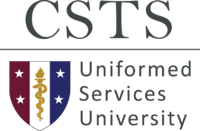Lei Zhang, MD
Senior Scientist, Center for the Study of Traumatic Stress
Associate Professor, Psychiatry
Uniformed Services University
The ultimate goal of Dr. Zhang’s research is to acquire and provide the knowledge that is necessary for the development of novel and effective molecular tools for stress-related diseases such as PTSD and TBI. His laboratory is dedicated to elucidating the molecular and cellular mechanisms of the actions of genes such as p11 (S100A10), BDNF and mitochondria focused-genes in stress, PTSD and TBI. Their long-term goal is to establish a molecular basis from which they can search for a therapeutic target or biomarker for PTSD and TBI. Previously, they found that p11 is associated with PTSD. Its mRNA levels are increased in the post-mortem prefrontal cortex (area 46) of PTSD patients. Stress-induced p11 over expression in the prefrontal cortex (PFC) accompanied by elevation of corticosterone concentration in the blood was also observed in rats subjected to three days of inescapable shock. Their mechanism study demonstrated that through glucocorticoid response elements (GREs) within the p11 promoter, dexamethasone (Dex), a synthetic glucocorticoid, up-regulates p11 expression, which can be attenuated by either a glucocorticoid receptor antagonist, RU486, or mutating two of the three GREs. Later in their translational study, they found that levels of p11 as a potential biomarker in peripheral blood distinguish patients with PTSD from those with other major psychiatric disorders including bipolar depression, major depressive disorder and schizophrenia.
Dr. Zhang’s research program has undertaken the following specific objectives: (1) To identify gene networks or pathways of PTSD and TBI, and (2) To investigate the novel molecular regulatory mechanism of stress, PTSD and TBI in vivo and in vitro. This research will provide useful information, which might help translational research, from bench to bed.







